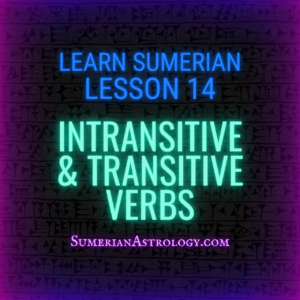Lesson 14
Sumerian Transitive and Intransitive Verbs
In this lesson, you’ll learn about Sumerian Intransitive and Transitive Verbs. Don’t worry—they’re easier than they sound!
Helpful Terms
Here are some helpful terms you’ll encounter in this lesson. You can see a full list in the Glossary of Terms.
- intransitive (trans.): a verb that doesn’t require a direct object to complete its meaning.
- transitive (intrans.): a verb that requires a direct object to complete its meaning.
Vocabulary to Memorize
I highly recommend memorizing these Sumerian words, as you’ll encounter them often in the upcoming lessons!
- dúr 𒂉 n., anus, buttocks; dwelling. v., to sit (intrans.); be seated; set down; break wind; occupy, dwell.
- durun 𒂉𒂉 v., to sit (pl.) (trans.).
- gu-za 𒆪𒃻 n., throne, chair.
- tuš 𒂉 n., home. v., to sit, lie down (trans.); to sing; to dwell, reside, be at home, settle; set up, establish.
- úš 𒍗 n., blood, gore; death. v., to block; die; be dead; kill. adj., dead.
Vocabulary--Full List
Here are the vocabulary terms for this lesson. Be sure to look them over as they’re updated with additional meanings each lesson. You can see the full Sumerian Lexicon here.
- a 𒀀 n., water, semen, progeny, canal, flood. part., in, at, when; nominalizing suffix.
- an 𒀭 n., heaven; high. det., indicates the name of a deity. part., 3rd person (pers.) infix when preceded by /a/.
- ba 𒁀 n., allotment, portion, wages. v., to give; pay; divide; distribute; allot. part., conjugational prefix.
- dúr 𒂉 n., anus, buttocks; dwelling. v., to sit (intrans.); be seated; set down; break wind; occupy, dwell.
- durun 𒂉𒂉 v., to sit (pl.) (trans.).
- e 𒂊 v., to speak, say; do; water. part., [performed] by (the agent); in, at, beside.
- gu-za 𒆪𒃻 n., throne, chair.
- lú 𒇽 n., man, male; human, person.
- lugal 𒈗 n., king; owner, master, lord.
- tuš 𒂉 n., home. v., to sit, lie down (trans.); to sing; to dwell, reside, be at home, settle; set up, establish.
- úš 𒍗 n., blood, gore; death. v., to block; die; be dead; kill. adj., dead.

Sumerian Transitive and Intransitive Verbs
It’s important to understand the difference between Sumerian transitive and intransitive verbs. While they sound difficult, they’re actually quite simple. Consider the following sentences:
- Intransitive: The cat eats.
- Transitive: The cat eats mice.
As you can see, the only difference between the two sentences the presence of a direct object in the second.
Put simply, in a transitive sentence, the action is transferred from the subject (to the object).
In an intransitive sentence, no action is transferred, because there is no direct object.
- transitive—TRANSFERS the action from the subject to the direct object.
- intransitive—DOES NOT TRANSFER the action, because there is no direct object.
Using umerian Transitive and Intransitive Verbs
Sumerian verbs can be intransitive or transitive depending on how they’re used in the sentence. Consider the following uses of the verb úš 𒍗 to die:
- Intransitive: lú ba-úš: 𒇽𒁀𒍗 The man died.
- lú 𒇽 man
- ba 𒁀 conjugational prefix
- úš 𒍗 to die
- Transitive: lugal-e lú ba-an-úš: 𒈗𒂊𒇽𒁀𒀭𒍗 The king killed the man.
Some Sumerian verbs have specific intransitive and transitive forms. For example:
- Intransitive: dúr 𒂉 to sit
- Transitive: tuš 𒂉 to sit (in/on a thing/place)
Unfortunately, the same cuneiform sign 𒂉 is used for both readings of the word. Fortunately, the correct reading can be determined by the surrounding context.
- lugal ba-dúr 𒈗𒁀𒂉 The king sat.
- lugal-e gu-za-a ba-an-tuš 𒈗𒂊𒀀𒆪𒃻𒁀𒀭𒂉 The king sat on the throne.
Additionally, some verbs have separate plural forms, which you’ll need to memorize.
- durun: 𒂉𒂉 they sit/sat (in/on a thing/place) (trans.)
Don’t worry! You’ll get the hang of transitive and intransitive Sumerian verbs in no time!
Your Sumerian Language Journey Continues!
In the next lesson, we’ll you’ll learn about Sumerian imperfective and perfective verbs, so be sure to subscribe to my substack to get all of my articles delivered to your inbox as soon as they post!










